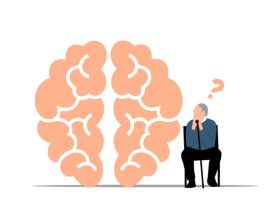You might think you’ll never have to worry about memory problems if you still know all the words to every song by your favourite boy band from the early 2000s and can recite the phone number of your childhood best friend.
Dementia and Alzheimer’s disease are much more common than you might think, even if only a small percentage of Americans have received a formal diagnosis. Dementia affects one in ten Americans over the age of 65, and 22% of those 65 and older experience mild cognitive impairment, which can be an indicator of more serious cognitive challenges to come, according to a study published in JAMA Neurology in October 2022. About a third of the population aged 65 and up falls into this category.
Decreases in our cognitive abilities (such as memory and learning) are a normal part of ageing. A diagnosis related to the brain may be made when the symptoms begin to interfere with daily functioning or with the prospect of living a long, healthy, and secure life.
The risk of developing dementia and other cognitive disorders can be affected by a number of factors, including genetics and lifestyle choices made by an individual or their family. Some things have been shown to lessen the likelihood of cognitive problems later in life, and these include:
- Adopting a more plant-based diet
- Maintaining a steady blood sugar level
- Lessening one’s dependence on highly processed foods
- Taking care of one’s blood pressure
- Abstaining from tobacco use
- Gaining and maintaining a healthy sleep routine Maintaining active social lives
- Including exercise in a daily routine
Researchers from Ohio State and the University of Michigan decided to focus their recent efforts on clarifying the cognitive confusion…and possibly preventing future instances of cognitive decline…because there appears to be a gap in the understanding of all of the possible risk factors for cognitive decline.
Personal education level, parental education, household income and wealth, race, occupation, and depression status are among the less frequently cited factors that account for about 38% of the cognitive function variation at age 54, according to a study published on February 8 in the journal PLoS ONE.
Conclusions of a Study on the Brain’s Health
More than 7,000 American adults born between 1931 and 1941 who participated in the Health and Retirement Study were analysed by lead author Hui Zheng, Ph.D., professor in the Department of Sociology at Ohio State University. Health biometrics, smoking history, medical diagnoses, and socioeconomic status were collected from 1996 to 2016 for this cognition-related study.
When trying to determine how much of an effect each of the factors Dr. Zheng and his team studied might have on neuropathology, they employed a statistical method (aka diseases of the brian, such as cognitive decline). They determined that the combined influence of environmental factors and adult disease and behaviour was only about 5.6%. But a combination of factors including race, wealth, and mental health accounted for a whopping 38% of the risk factor. This includes the individual’s and their parents’ levels of education, income, and occupation.
Also Read :A new study finds that nearly 90% of small businesses hoard workers
Up until now, medical professionals and researchers had largely suggested that an individual’s own decisions and actions matter most in keeping their brain healthy. Based on the findings of this study, it is time to give social factors a greater role in determining health.
In Concluding
This new study on brain health found that factors such as education, income, race, and depression status, in addition to healthy lifestyle habits, play a surprisingly large role in the likelihood of developing dementia or Alzheimer’s disease.
No single behaviour or risk factor can be singled out as the sole cause of mental decline. The quality of one’s life has a profound effect on brain health at all ages. Consider one’s sense of safety at home, the presence or absence of mental health issues like depression, the extent to which one enjoys financial independence, and the amount of time spent studying in order to increase one’s “brain bank.”
This highlights the need to consider brain health from both an individual and a societal perspective. A well-planned community provides its residents with opportunities to learn and earn a living, care for their mental and physical health, engage in physically active pursuits in a safe environment, eat a wide variety of foods, and form meaningful relationships with their neighbours. This is, without a doubt, a lofty and substantial goal that is easier to state than to achieve. It certainly wouldn’t hurt to start exploring ways to improve our current landscape, especially considering that nearly one-third of all Americans over the age of 65 are affected by cognitive impairment.







Leave a Reply